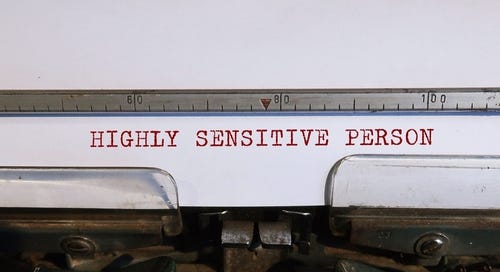Does the word "sensitive" turn you off?
By honoring the strengths of Highly Sensitive People (HSPs), we can create a new narrative. Everyone stands to gain
I work with a lot of people with enormous empathy, strong intuition, and a natural talent for connecting with others — classic traits of a Highly Sensitive Person (HSP). But they often don’t like being described as “sensitive.” The word evokes a host of uncomfortable associations — from being stigmatised in the playground to perceived weakness in the workplace.
Despite all the insights I’ve gained since I came across Dr Elaine Aron’s work on HSPs almost a decade ago, I’ve also struggled with the S-word. I was fortunate enough not to have been “sensitivity-shamed” as a child (partly because I learned early on to keep a tight lid on my emotions). But the word “sensitive” still doesn’t sit quite right with me. Despite all I’ve learned about the strengths HSPs possess, I still don’t seem to have fully shaken off the cultural programming that sees sensitivity as a vulnerability to be hidden, rather than a gift to be celebrated.
It’s time to reclaim our birthright.
Whatever we may feel about the word “sensitive,” it’s probably still the best starting point for building a vocabulary to help understand ourselves better — and show up more powerfully in the world. I loved this TEDx talk by Elena Herdieckerhoff, an intuitive coach and business mentor. Although the talk came out in 2016, its message has never been more important: We need to “rewrite the negative cultural narrative” about sensitivity, and turn it into a positive one:
“We need to erase the notion that sensitivity is a weakness to finally benefit from its many strengths,” Herdieckherhoff said. “By doing so, we will create an environment where everybody is safe to express their softer side, not just HSPs.”
Some of the conversations I’ve been having with coaching clients in the past few weeks have also got me thinking about how each of us can help advance this new narrative. Here’s a few of my suggestions — and I’d love to hear your ideas in the comments below:
Explain that being an HSP is healthy and normal: High sensitivity is not a diagnosis, condition or disorder — it’s a type of temperament that about 20 percent of the population are born with. It’s all to do with how our nervous systems are calibrated: Some of us are wired to be more responsive to our environment (and therefore more prone to being over-stimulated). We process sensory input more deeply, and we often need to move our emotions through our bodies — whether through tears, anger or movement. The more we can learn, talk and write about our sensitivity, the more this awareness will ripple through wider society. We’re already starting to see coverage of HSPs growing in the media. Let’s build on this momentum.
Share educational resources: I discovered Dr Aron’s research while I was working as a clinical psychologist in Child and Adolescent Mental Health Services in the National Health Service. I could see that some children were different — and reading about HSPs was a lightbulb moment. I went on to train to be an HSP-knowledgeable therapist. But in my experience, understanding of HSPs is still very limited in many professional settings, including in mental health, education, and most certainly in the corporate world. By having conversations about high sensitivity, sharing articles and books (and better yet — inviting people to sign up to The HSP Revolution), we can raise awareness of the unique contribution HSPs make.
Reclaiming the word “sensitivity” benefits everyone — not just HSPs: As Herdieckerhoff pointed out in her talk, everyone gains from living in a society where sensitivity is valued. While HSPs may have above-average sensitivity, we don’t have a monopoly on this attribute — sensitivity exists on a spectrum. A more supportive society would give everyone permission to explore their own sensitivity, and share in the resulting empathy, creative vision and big picture thinking.
For anyone who might have missed last week’s newsletter on HSPs and music, here is a 90-second video summary:
As always, I very much welcome comments below — feedback really helps to generate ideas for new posts.
See you next week!




